
The 1792 United States presidential election was the second quadrennial presidential election. It was held from Friday, November 2, to Wednesday, December 5, 1792. Incumbent President George Washington was elected to a second term by a unanimous vote in the electoral college, while John Adams was re-elected as vice president. Washington was essentially unopposed, but Adams faced a competitive re-election against Governor George Clinton of New York.
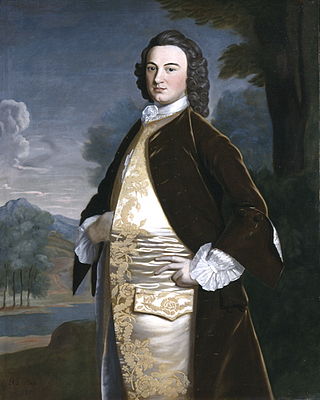
James Bowdoin II was an American political and intellectual leader from Boston, Massachusetts, during the American Revolution and the following decade. He initially gained fame and influence as a wealthy merchant. He served in both branches of the Massachusetts General Court from the 1750s to the 1770s. Although he was initially supportive of the royal governors, he opposed British colonial policy and eventually became an influential advocate of independence. He authored a highly political report on the 1770 Boston Massacre that has been described by historian Francis Walett as one of the most influential pieces of writing that shaped public opinion in the colonies.

Robert Charles Winthrop was an American lawyer, philanthropist, and Whig Party politician who represented Massachusetts in the United States House and Senate from 1840 to 1851. He served as the 18th Speaker of the United States House of Representatives and was a political ally and colleague of Daniel Webster. After a rapid rise in Massachusetts and national politics and one term as speaker, Winthrop succeeded Webster in the Senate. His re-election campaign resulted in a long, sharply contested defeat by Charles Sumner. He ran for Governor of Massachusetts in 1851 but lost due to the state's majority requirement, marking the end of his political career and signaling the decline of the Massachusetts Whig Party.
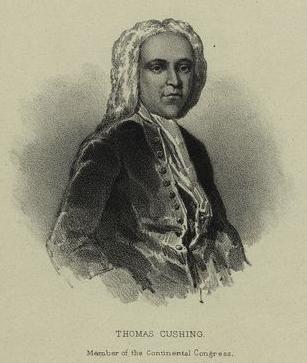
Thomas Cushing III was an American lawyer, merchant, and statesman from Boston, Massachusetts. Active in Boston politics, he represented the city in the provincial assembly from 1761 to its dissolution in 1774, serving as the lower house's speaker for most of those years. Because of his role as speaker, his signature was affixed to many documents protesting British policies, leading officials in London to consider him a dangerous radical. He engaged in extended communications with Benjamin Franklin who at times lobbied on behalf of the legislature's interests in London, seeking ways to reduce the rising tensions of the American Revolution.

The 1970 United States Senate elections was an election for the United States Senate. It took place on November 3, with the 33 seats of Class 1 contested in regular elections. Special elections were also held to fill vacancies. These races occurred in the middle of Richard Nixon's first term as president. The Democrats lost a net of three seats, while the Republicans and the Conservative Party of New York picked up one net seat each, and former Democrat Harry F. Byrd Jr. was re-elected as an independent.

The 1964 United States Senate elections were held on November 3. The 33 seats of Class 1 were contested in regular elections. Special elections were also held to fill vacancies. They coincided with the election of President Lyndon B. Johnson by an overwhelming majority, to a full term. His Democratic Party picked up a net two seats from the Republicans. As of 2023, this was the last time either party has had a two-thirds majority in the Senate, which allowed the Senate Democrats to override a veto, propose constitutional amendments, or convict and expel certain officials without any votes from Senate Republicans. However, internal divisions would have prevented the Democrats from having done so. The Senate election cycle coincided with Democratic gains in the House in the same year.
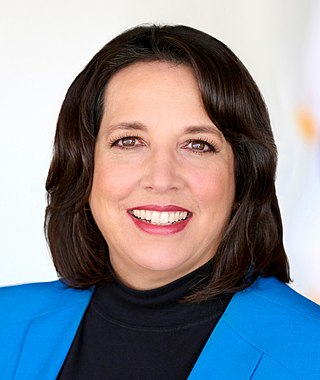
The lieutenant governor of Massachusetts is the first in the line to discharge the powers and duties of the office of governor following the incapacitation of the Governor of Massachusetts. The constitutional honorific title for the office is His, or Her, Honor.
The 1851 United States Senate election in Massachusetts was held during January 1851. Free Soil Party candidate Charles Sumner was elected by a coalition of Free-Soil and Democratic legislators over Whig incumbent Robert C. Winthrop, who had been appointed to finish the term of retiring Senator Daniel Webster.

United States gubernatorial elections were held on November 8, 2022, in 36 states and three territories. As most governors serve four-year terms, the last regular gubernatorial elections for all but two of the seats took place in the 2018 U.S. gubernatorial elections. The gubernatorial elections took place concurrently with several other federal, state, and local elections, as part of the 2022 midterm elections.
Elections to the Massachusetts Senate were held during 1787 to elect 40 State Senators. Candidates were elected at the county level, with some counties electing multiple Senators.
Elections to the Massachusetts Senate were held during 1788 to elect 40 State Senators. Candidates were elected at the county level, with some counties electing multiple Senators.
Elections are currently held every four years to elect the mayor of Springfield, Massachusetts.
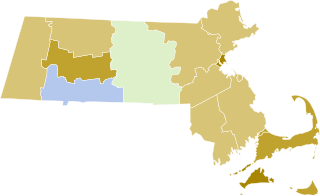
The 1853–54 Massachusetts gubernatorial election consisted of an initial popular held on November 14, 1853, which was followed by a legislative vote that was conducted on January 9, 1854, which elected Whig Party nominee Emory Washburn. The ultimate task of electing the governor had been placed before the Massachusetts General Court because no candidate received the majority of the vote required for a candidate to be elected through the popular election.

The 1851–52 Massachusetts gubernatorial election consisted of an initial popular vote held on November 10, 1851, followed by a legislative vote conducted on January 12, 1852. Incumbent Democrat Governor George S. Boutwell was reelected to a second term in office. The ultimate task of electing the governor had been placed before the Massachusetts General Court because no candidate received the majority of the vote required for a candidate to be elected through the popular election.

The 1850–51 Massachusetts gubernatorial election consisted of an initial popular held on November 11, 1850 that was followed by a legislative vote that was conducted on January 11, 1851. It saw the election of Democratic Party nominee George S. Boutwell. The ultimate task of electing the governor had been placed before the Massachusetts General Court because no candidate received the majority of the vote required for a candidate to be elected through the popular election.

The 1848–49 Massachusetts gubernatorial election consisted of an initial popular election held on November 13, 1848 that was followed by a legislative vote held on January 8, 1949. Incumbent Whig Governor George N. Briggs was reelected.
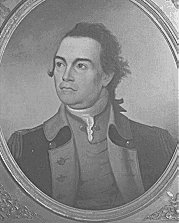
The 1789 New Hampshire gubernatorial election was held on 10 March 1789 in order to elect the President of New Hampshire. Federalist candidate and former President John Sullivan defeated incumbent Acting President John Pickering and 1785 & 1787 President Anti-Federalist candidate Josiah Bartlett. Since no candidate received a majority in the popular vote, Sullivan was elected by the New Hampshire General Court per the state constitution.

The 1806 Rhode Island gubernatorial election was held on 2 April 1806 in order to elect the Governor of Rhode Island. Federalist nominee Richard Jackson Jr. won a plurality of the vote against incumbent Democratic-Republican Governor Henry Smith and Democratic-Republican candidate and incumbent Chief Justice of the Rhode Island Supreme Court Peleg Arnold. However, as no candidate received a majority of the total votes cast as was required by Rhode Island law, the election was forwarded to the Rhode Island legislature. When the legislature was also unable to elect a Governor, it was decided that Democratic-Republican Lieutenant Governor-elect Isaac Wilbour would serve out the term as Acting Governor.

The 1786 Massachusetts gubernatorial election was held on 3 April 1786 in order to elect the Governor of Massachusetts. Incumbent Governor James Bowdoin won re-election against former Governor John Hancock.

The 1790 Massachusetts gubernatorial election was held on 5 April 1790 in order to elect the Governor of Massachusetts. Incumbent Governor John Hancock won re-election against former Governor James Bowdoin.



















